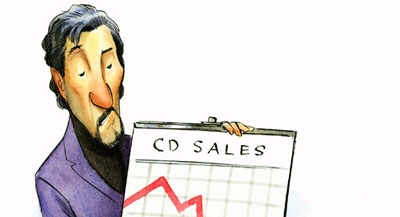Where Have All the CDs Gone? Page 2
New Kids in Town The RIAA could be ignoring other factors that are having a negative effect on CD sales. Bernoff argues that growing competition from other forms of entertainment, such as DVD players and videogames, and the consolidation of radio-station ownership are having a much more deleterious effect on sales than downloads. For example, people in the U.S. spent almost $7 billion on video and computer games in 2002, and more than one-third of all U.S. homes now have a DVD player. Given that the price difference between many top-selling CDs and DVDs is just a few dollars, it's not hard to imagine many people opting for a sexier, newer format that offers not just music, but a movie in multiple formats that can include directors' cuts, commentaries, and other bonuses.
Perhaps even more significant, the consolidation in radio has resulted in Clear Channel Communications controlling 60% of the rock radio stations in the U.S. That means listeners are exposed to more homogenized playlists, so fewer artists get exposure, and listeners hear a narrower selection of songs. Also, radio promotion - where labels pay promoters to get stations to play certain songs - has become too expensive for all but the major labels. As a result, mainstream radio rarely plays music from emerging artists signed to small or midsize labels. Even MTV plays fewer and fewer music videos. So people are turning to the Internet as the primary medium through which they can discover - and perhaps buy - new music. 
Also, consolidation in the music industry, where four of the five major labels are owned by large public corporations, has increased the pressure on music divisions to make "hit" records to meet quarterly earnings expectations. This has resulted in the labels signing fewer bands, paring rosters and staffs, and taking fewer marketing risks. If a new artist's album doesn't generate excitement quickly, the label will shift its resources to another project. While many of these artists eventually move to smaller independent labels, these labels tend to lack the money and marketing muscle to generate huge sales numbers and often lack top-shelf distribution and international sales. The result is lower sales for many artists. Consolidation has also contributed to the majors releasing fewer CD titles over the past few years.
Click for "The Big Picture" graphic sidebar.Too Little, Too Late? The RIAA also claims that downloads take money out of musicians' pockets. But thanks to high-profile suits filed by artists like the Dixie Chicks and Incubus against their labels, fans are becoming aware of record-industry contracts and accounting policies that result in few artists ever making much money from the sale of their music. This might lead to fans feeling less guilty about "stealing" music.
The record industry acknowledges that less than 10% of its artists will "recoup," or make back, the advances they're given when they sign a recording contract. In fact, rather than worrying about lost sales, many artists view the Internet as their lifeline to attracting new fans. In a recent opinion piece for the Los Angeles Times, Janis Ian, an outspoken proponent of downloading, said that in the six months she's been offering free downloads of her songs on her Web site, "Thousands of people have downloaded my music . . . and they're not trying to steal. They're just looking for music they can no longer find on the tight playlists of their local radio stations. That's how new artists gain listeners these days - through the Internet."
That the labels have been painfully slow to adapt to the Internet and the new ways people want to receive music could also be hurting sales. If they want people to migrate from free downloads to paid services, they have to offer subscription services that can not only compete, but add incremental value. There are plenty of examples - from cable TV to bottled water - of people paying for services or items they can get for free. But the labels still seem mired in control issues, which has resulted in lawsuits, draconian legislative initiatives that trample on people's fair-use rights, and threats of invasive actions against the very people who buy their product.
All of this chest-beating and bullying by the labels has generated lots of ill will. Until recently, hardly anyone even knew what the RIAA was - today, its Web site is hacked and shut down about once a month. When the labels finally launched online ventures, they completely missed the mark with limited catalogs and restrictive digital rights-management schemes that impeded or prevented the things people want to do most: make CD compilations and transfer music to portable MP3 players. More recent online services such as MusicNet and Pressplay are steps in the right direction, but they have to go farther - with things like more attractive pricing and deeper catalogs - to compete with free services.
For instance, the average price of a download is 99¢ a track, so downloading an 18-track CD song by song comes to about $18. While this is only slightly more than the average price of a CD, you're getting compressed audio and no packaging, and you have to devote time and effort to downloading the music.
That's not to say that free downloads and file-sharing networks aren't having an impact on the music business. In fact, given the usage statistics, it's surprising they aren't having a bigger impact. But they're probably not the sole - or even major - cause of the industry's woes. The irony is that, like other technological advances bitterly fought by the music industry - from player-piano rolls to the audio cassette - the Internet is probably its salvation. Forrester Research predicts that by 2007, 17% of the industry's revenues, or $2.1 billion, will come from downloads. Jupiter Research's projections are even rosier.
Recently, it appeared that the music industry might abandon its confrontational approach in favor of more diplomatic solutions. In a keynote speech in March before the National Association of Recording Merchandisers (NARM), retiring RIAA chairwoman Hilary Rosen said the industry needed to focus on buyers: "It's time to come together. Now is our opportunity to put [consumers'] interests first." Among the ways the industry could do this, she said, was to meet the demand for music in multiple formats, offer a deeper catalog, and enable people to make compilations "without feeling guilty or like criminals. Fighting piracy is a waste of time if the customer is not served in the legitimate marketplace."
Such hope, however, turned out to be short-lived. That same week, the RIAA sent letters to 300 U.S. companies complaining about copyrighted materials on their corporate networks, warning, "These acts of infringement could expose your employees and your company to significant legal damages." Rosen's yet-to-be-named successor has a tall order to fill: find a way to stop the RIAA from shooting itself in the foot and get the record labels back in the business of effectively distributing their music.
- Log in or register to post comments


























































